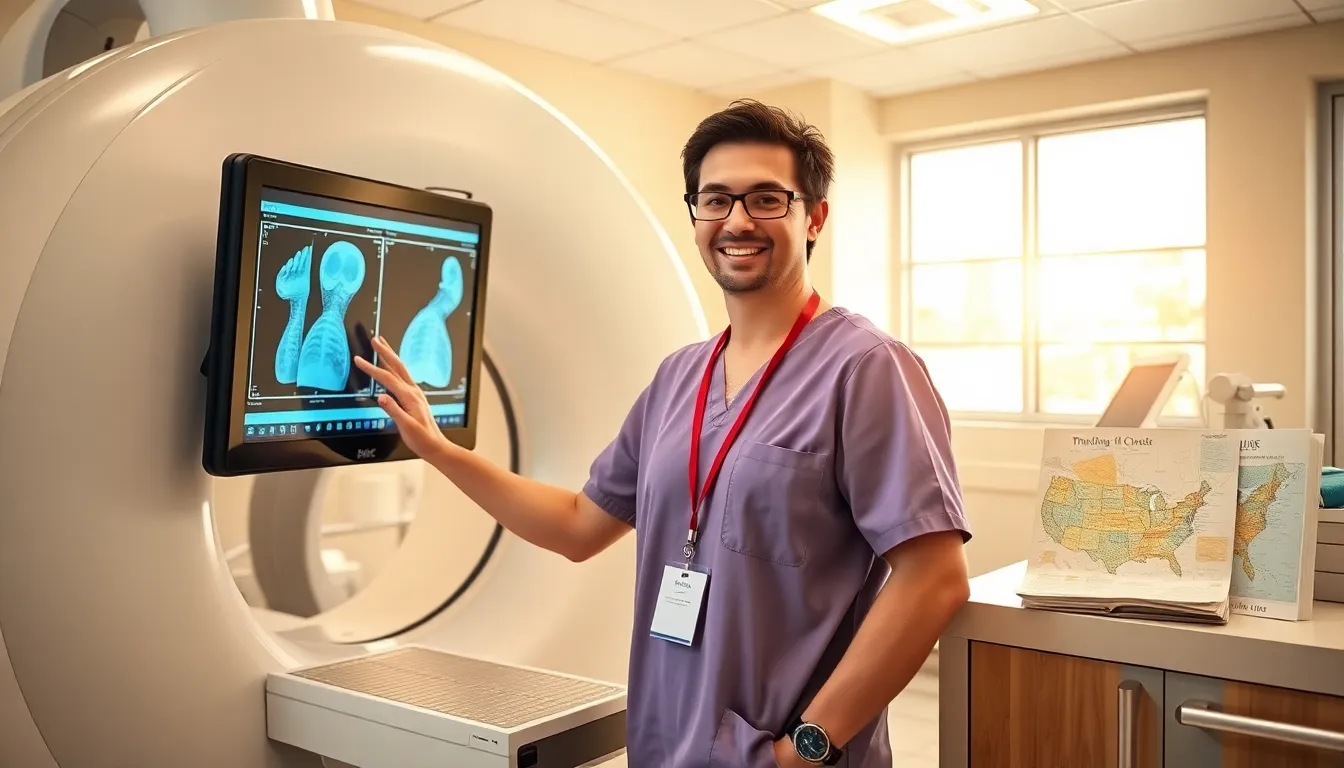Table of Contents
ToggleEver thought about hitting the road with a rad tech career? Picture this: breathtaking views, new adventures, and a paycheck that keeps smiling back at you. If you’re curious about how much travel rad techs make while embracing the thrill of nomadic living, you’re in the right place. In this comprehensive guide, we’ll investigate into the nitty-gritty of travel rad tech salaries, enlightening you on everything from average earnings to what keeps these techies rolling from one assignment to the next. So buckle up – the journey to understanding travel rad tech salaries is about to take off.
Understanding Travel Rad Tech Roles

Travel radiologic technologists, or travel rad techs, specialize in imaging and diagnostics while moving from one healthcare facility to another. These professionals perform crucial duties such as taking X-rays, CT scans, and MRIs, aiding in patient diagnoses and care. The appeal of the travel rad tech lifestyle lies not just in the scenery but in the flexibility and diverse work environments.
Typically, a travel rad tech works as a contractor, filling in for staff shortages and temporary positions across various locations. Some brave souls even choose assignments in underserved areas where healthcare resources are scarce. Being adaptable, quick to learn new technologies, and capable of handling varied equipment are essential traits in this role. It’s not just about the paycheck: it’s about making a genuine impact.
The unique lifestyle of a travel rad tech means that each job brings new experiences. With each assignment, they might find themselves in a bustling urban hospital one month and a tranquil rural clinic the next. The variety keeps the work fresh and engaging. Travel rad techs are the adventure seekers and problem solvers of the healthcare world.
Factors Influencing Travel Rad Tech Salaries
Several critical factors come into play when determining the salary of a travel rad tech. To start, their level of experience significantly impacts earnings. As with many professions, seasoned techs with years of hands-on experience often command higher salaries compared to fresh graduates just starting out.
Another important factor is specialization. Certain radiologic technology fields, such as interventional radiology or mammography, might have higher salary potentials due to their complexity and demand for specialized skills. Also, education plays a role: a tech with advanced certifications or a bachelor’s degree might find themselves at the top of the pay scale.
Geographic location is yet another influencer. In cities with high demands for healthcare professionals and a higher cost of living, salaries may skew upwards. Similarly, demand and supply within specific locales can directly affect paycheck sizes. Working in areas facing shortages of healthcare workers often leads to attractive pay packages and bonuses.
Finally, the specific agency or employer can make a difference. Some travel agencies offer incentives like housing stipends and bonuses at the end of contracts that can significantly boost earnings.
Average Salary Ranges by Location
When it comes to travel rad tech salaries, location matters. According to recent data, the average salary for travel rad techs can vary widely across the United States. For instance, techs in metropolitan areas like San Francisco or New York City can earn upwards of $40 to $50 per hour due to higher living expenses and demand for skilled professionals.
On the other hand, techs in less populated regions, such as the Midwest, may see average hourly wages ranging from $30 to $40. But, these areas may also offer perks like lower living costs.
According to surveys, the national average salary for travel rad techs typically ranges between $60,000 to $100,000 annually. It’s also not uncommon for seasoned travelers to pull in $120,000 or more, depending on location, assignment length, and specific expertise. In regions where infrastructure is limited and patient volumes are high, salaries can significantly exceed these averages.
Real-life stories often highlight that many travel rad techs negotiate their pay based on their prior experience and skill set, making it essential to research and advocate for oneself.
Benefits and Incentives for Travel Rad Techs
Beyond salaries, many travel rad techs enjoy a range of enticing benefits and incentives that make the role even more appealing. Most staffing agencies offer housing stipends, which can significantly alleviate living expenses during assignments. For those who prefer to travel with all the comforts of home, some agencies also provide fully-furnished accommodations.
Also, many agencies offer healthcare benefits, including medical, dental, and vision coverage, because nothing says “I care” like a full benefits package when you’re navigating new adventures.
Some agencies provide bonuses for completing assignments, typically referred to as completion bonuses. These can be substantial, adding a nice cushion to an already attractive paycheck. Travel stipends or reimbursement for transportation to the assignment location are also common incentives.
Also, the nature of the role itself offers a unique work-life balance that many crave. Rad techs often get to explore new areas during assignments, enjoy flexible schedules, and have opportunities to meet different people. The experience can lead to professional growth and exciting networking opportunities.
Career Outlook and Opportunities
The career outlook for travel rad techs looks quite promising. As the healthcare industry continuously evolves and expands, there’s a growing demand for trained professionals in radiology. The U.S. Bureau of Labor Statistics (BLS) projects employment for radiologic and MRI technologists to grow by around 9% from 2020 to 2030, which is faster than the average for all occupations.
The rise in aging populations, coupled with advances in imaging technology, means that the demand for highly skilled travel rad techs is expected to remain robust. Facilities are looking for professionals who are flexible and can step into various roles on short notice, so enhancing job security for those in the field.
As they gain experience, many rad techs find opportunities to further increase their earning potential by stepping into managerial or specialized roles. Additional certifications can pave the way for positions such as clinical educator or imaging supervisor, which can provide both higher salaries and further professional satisfaction.




